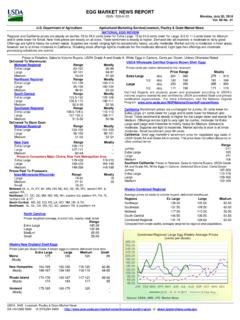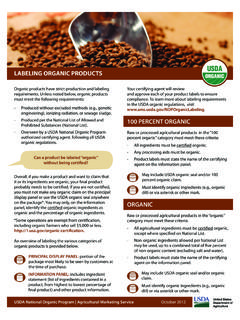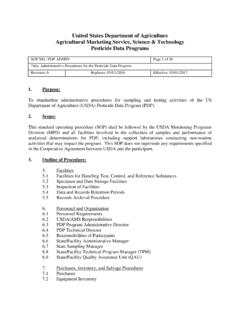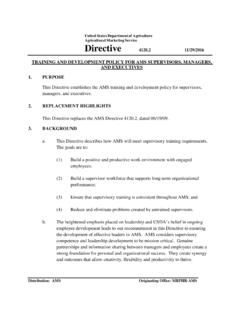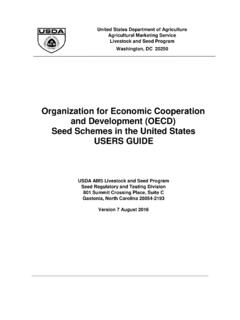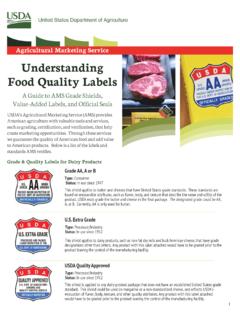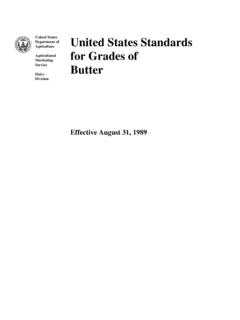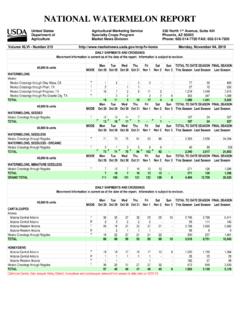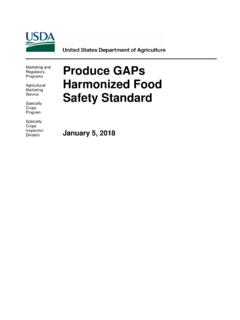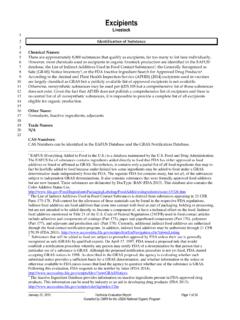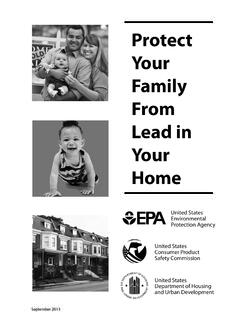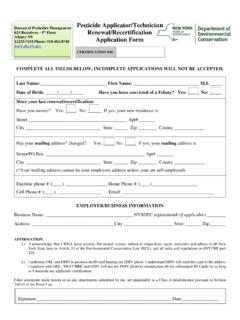Transcription of IMPORTING ORGANIC PRODUCTS INTO THE U.S.
1 IMPORTING ORGANIC PRODUCTS INTO THE ORGANIC agriculture is a fast growing sector in agriculture, creating jobs, economic growth, and entrepreneurial opportunities. The National ORGANIC Program (NOP), part of USDA's Agricultural Marketing Service (AMS), establishes international ORGANIC import and export policies to facilitate trade and expand market opportunities for certified ORGANIC farms and businesses around the world. Imported ORGANIC PRODUCTS must be certified to one of the Terms of the Arrangement. To trade PRODUCTS under the following standards to be sold in the United States: partnership, certified operations must: 1. The USDA ORGANIC regulations -- Produce livestock, or a product that includes ingredients USDA authorizes organizations around the world to certify derived from ORGANIC livestock, without the use of antibiotics. farms and businesses to the USDA ORGANIC regulations. -- Meet additional specifications for wine.
2 Learn about the certification process and view a list of -- Ship imports with an NOP Import Certificate and ORGANIC accredited certifiers at: certificate completed by an EU-authorized certification body. ORGANIC -certification/becoming- certified . 2. An authorized international standard Excluded PRODUCTS . Aquatic animals. The has established ORGANIC trade arrangements with Labeling Requirements. PRODUCTS must comply with the USDA. Canada, the European Union, Japan, Republic of Korea ORGANIC labeling requirements. For packaged retail PRODUCTS , and Switzerland. These arrangements help food producers labels or stickers must state, certified ORGANIC By (insert name located in the import ORGANIC ingredients that are not of EU certification body), and may display the USDA ORGANIC produced within the View details: seal and/or the EU ORGANIC logo. NOPI nternationalAgreements. JAPAN. CANADA Effective January 1, 2014 : Plants, including mushrooms, and Effective June 30, 2009: PRODUCTS produced worldwide and plant-based processed PRODUCTS (such as grape juice or corn certified to the Canada ORGANIC PRODUCTS Regulations can be meal) certified to the Japanese Agricultural Standards (JAS) can sold as ORGANIC in the be sold as ORGANIC in the Terms of the Arrangement.
3 To trade PRODUCTS under the PRODUCTS must be either produced or have had final processing partnership, certified operations must: or packaging occur within Japan. -- Produce livestock without the use of antibiotics. Terms of the Arrangement. Only plant and plant-based -- Ship imports with documentation that states, certified PRODUCTS are covered under the trade arrangement. To trade in compliance with the terms of the US-Canada ORGANIC PRODUCTS under the partnership, certified operations must: Equivalency Arrangement.. -- Ship imports with an NOP Import Certificate and ORGANIC Labeling Requirements. PRODUCTS must comply with the USDA certificate completed by a JAS-authorized certifier. ORGANIC labeling requirements. For packaged retail PRODUCTS , Labeling Requirements. PRODUCTS must comply with the USDA. labels or stickers must state, certified ORGANIC By (insert name ORGANIC labeling requirements. For packaged retail PRODUCTS , of Canadian certifier), and may display the USDA ORGANIC seal labels or stickers must state, certified ORGANIC By (insert name and/or the Canada ORGANIC logo.)
4 Of JAS certifier), and may display the USDA ORGANIC seal and/or the Japanese ORGANIC logo. EUROPEAN UNION (EU) Excluded PRODUCTS . Non-plant-based PRODUCTS , such as meat, Effective June 1, 2012: PRODUCTS certified to the EU ORGANIC dairy PRODUCTS and alcoholic beverages, are outside the scope standards can be sold as ORGANIC in the of the trade arrangement and need to be certified to the USDA. ORGANIC standards. PRODUCTS must be either produced or have had final processing or packaging occur within the EU. National ORGANIC Program | Agricultural Marketing Service December 2016. IMPORTING ORGANIC PRODUCTS INTO THE (continued). REPUBLIC OF KOREA GENERAL IMPORT REQUIREMENTS. Effective June 1, 2014 : Processed food PRODUCTS certified to the In addition to ORGANIC requirements, traded agricultural Korean ORGANIC regulations can be sold as ORGANIC in the PRODUCTS must meet all general or commodity-specific import requirements.
5 Importers and customs services can provide PRODUCTS must have had final processing occur in Korea. detailed guidance. Terms of the Arrangement. To trade PRODUCTS under the Labeling. ORGANIC PRODUCTS sold in the must meet all partnership, certified operations must: Federal labeling requirements (general and ORGANIC ). -- Produce processed food PRODUCTS as defined by the Korean Import Codes. For certain ORGANIC PRODUCTS , traders must use Food Code (see ). harmonized tariff schedule codes for tracking purposes. -- Produce PRODUCTS with at least 95 percent ORGANIC ingredients. -- Be sure PRODUCTS do contain ingredients derived from Grading. Imported agricultural commodities must often meet animals produced with the use of antibiotics. product size, grade, quality, and maturity requirements. -- Ship imports with an NOP Import Certificate and an ORGANIC certificate completed by a Ministry of Agriculture, Food and Health Inspection.
6 Shipments must include permits, sanitary Rural Affairs (MAFRA)-accredited certification body. The NOP. certificates (animal PRODUCTS ), and phytosanitary certificates Import Certificate must state, certified in compliance with (plant PRODUCTS ) to ensure the product is healthy and free from the terms of the US-Korea ORGANIC Equivalency Arrangement.. pests requiring quarantine. Excluded PRODUCTS . Non-processed agricultural PRODUCTS , such as fresh pears or onions, are outside the scope of the Meat, Poultry, and Processed Egg PRODUCTS . The USDA only arrangement and need to be certified to the USDA ORGANIC allows imported meat, poultry, and processed egg PRODUCTS standards. from countries with inspection standards equivalent to standards. Labeling Requirements. PRODUCTS must comply with the USDA. ORGANIC labeling requirements. For packaged retail PRODUCTS , labels or stickers must state, certified ORGANIC By (insert name IDENTIFYING ORGANIC PRODUCTS .)
7 Of Korean certification body), and may display the USDA. If an ORGANIC logo (see below) is not on the exterior of the ORGANIC seal and/or the MAFRA ORGANIC seal. shipping box, shippers should review the: -- Document ( bill of lading) detailing sales of ORGANIC SWITZERLAND goods and specifying terms of delivery. Effective July 10, 2015: PRODUCTS certified to the Swiss ORGANIC -- Commercial invoice representing a complete record of the ordinances can be sold as ORGANIC in the business transaction. PRODUCTS must be either produced or have had final processing -- Any import/export certificate or attestations, as required or packaging occur within Switzerland. (see above). Terms of the Arrangement. To trade PRODUCTS under the -- ORGANIC certificate(s). partnership, certified operations must: -- Produce livestock, or a product that includes ingredients INTERNATIONAL ORGANIC LOGOS. derived from ORGANIC livestock, without antibiotics.
8 -- Product and label ORGANIC wine to the regulations of the IMPORTING country. -- Ship imports with an NOP Import Certificate and an ORGANIC United States Canada European Union certificate completed by a Swiss-authorized certification body. Labeling Requirements. PRODUCTS must comply with the USDA. ORGANIC labeling requirements. For packaged retail PRODUCTS , There is no Swiss labels or stickers must state, certified ORGANIC By (insert name ORGANIC seal of Swiss certification body), and may display the USDA ORGANIC seal. The Swiss Government does not administer an ORGANIC seal. Japan Korea Switzerla
